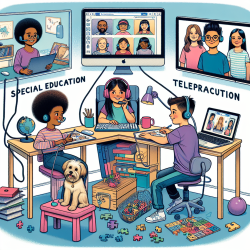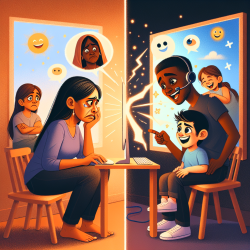Introduction
In the digital age, the prevalence of online hate has become a significant concern, particularly for adolescents who are navigating their formative years. The research article titled Associations between Witnessing and Perpetrating Online Hate in Eight Countries: The Buffering Effects of Problem-Focused Coping provides insightful data on the dynamics of online hate and the effectiveness of problem-focused coping strategies. This blog aims to help practitioners in the field of speech-language pathology and online therapy services, like those provided by TinyEYE, to enhance their skills by implementing these research findings.
The Impact of Online Hate
Online hate can manifest in various forms, such as offensive comments, threatening messages, or degrading posts that target individuals or groups based on characteristics like race, gender, or religion. The study highlights that adolescents who witness online hate are more likely to become perpetrators themselves. This cycle of aggression underscores the need for effective intervention strategies.
Problem-Focused Coping Strategies
The research identifies two key problem-focused coping strategies: assertive coping and technical coping. Assertive coping involves directly addressing the perpetrator, while technical coping includes actions like blocking the perpetrator or reporting the behavior. These strategies have been shown to reduce the likelihood of adolescents transitioning from bystanders to perpetrators of online hate.
Implementing Research Findings
Practitioners can leverage these findings to develop targeted intervention programs. Here are some actionable steps:
- Educate Adolescents: Implement educational sessions that teach adolescents about the differences between free speech and hate speech, and how to effectively report online hate.
- Develop Assertiveness Training: Create programs that empower adolescents to resist peer pressure and respond assertively to online hate.
- Enhance Media Literacy: Offer training on media skills, focusing on privacy settings, blocking/reporting features, and the importance of ethical media use.
- Peer Mentoring: Establish peer mentoring groups where adolescents can learn from each other and model positive online behavior.
Encouraging Further Research
While the study provides a robust foundation, further research is needed to explore additional coping strategies and their effectiveness. Practitioners are encouraged to contribute to this growing field by conducting studies that investigate the long-term impacts of these strategies on adolescent behavior.
Conclusion
By integrating problem-focused coping strategies into intervention programs, practitioners can play a pivotal role in reducing the incidence of online hate among adolescents. These efforts not only enhance the wellbeing of young individuals but also contribute to a safer and more inclusive online environment.
To read the original research paper, please follow this link: Associations between Witnessing and Perpetrating Online Hate in Eight Countries: The Buffering Effects of Problem-Focused Coping.










